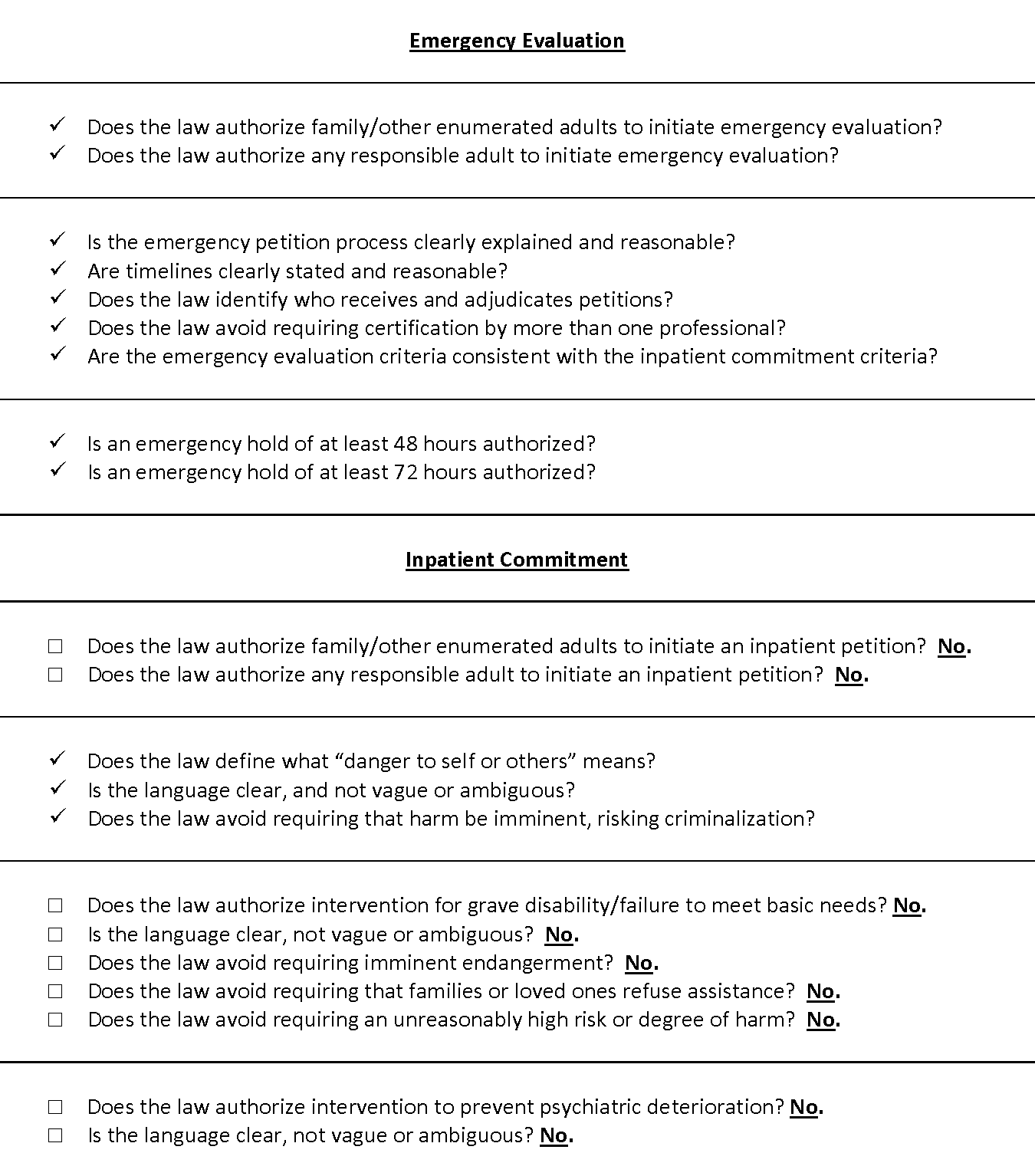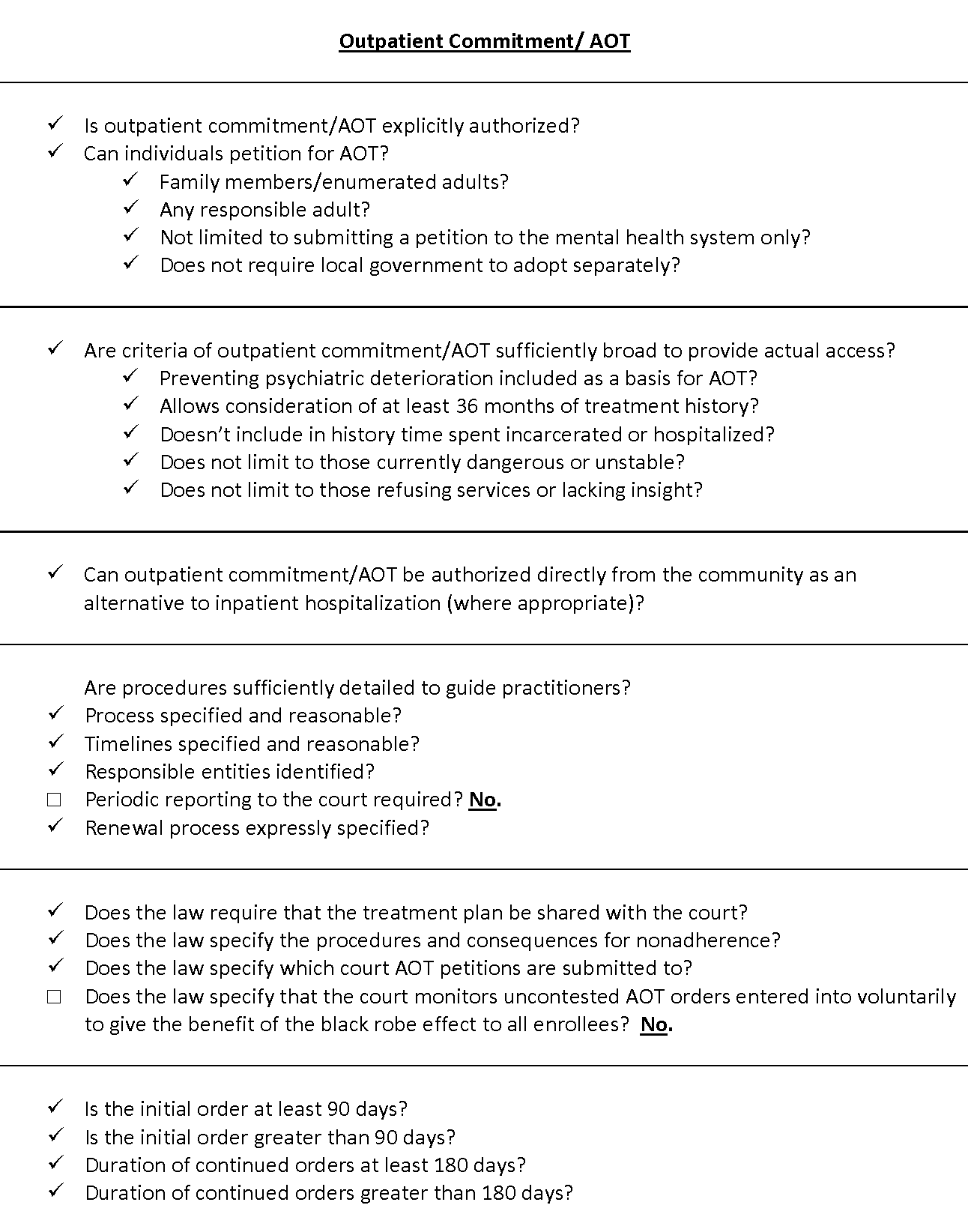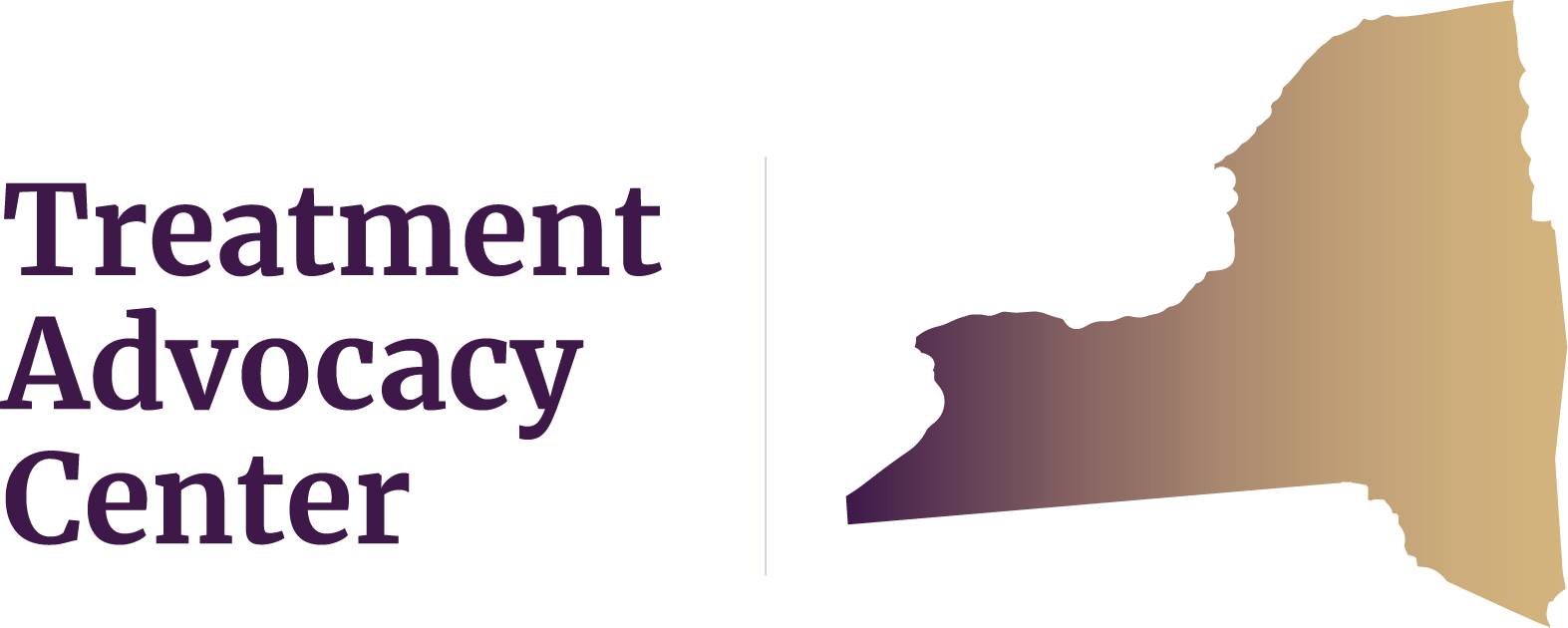Family Resources in Resources in New York
- New York State Office of Mental Health (omh.ny.gov) Resources and contacts
- New York State Information for Adults (omh.ny.gov) Search for adult mental health services and find information about housing, insurance, treatment laws, patient rights
- New York State Assertive Community Treatment (ACT) (omh.ny.gov) Information about standards and protocols for team-based outpatient care and a directory to search for an ACT program by county or city
- New York State Psychiatric Association information about the SAFE Act (nyspsych.org) Overview of 2013 amendments to the state’s Mental Hygiene Law related to risk of harm and gun ownership
- IPS Employment Center (ipsworks.org) Overview of programs for individual placement and support (IPS) to help people with SMI get and keep jobs
- 211 New York State (211nys.org) Call for help finding services, information, and resources
- Guardianship Basics (nycourts.gov) Overview of legal terms, options, and resources for guardians
- Rights of Inpatients in New York State Office of Mental Health Psychiatric Centers-2022 (omh.ny.gov) Handbook of patient rights, admission procedures, discharge planning, and more
- Available Services in New York City (nycwell.cityofnewyork.us) Inpatient, outpatient, and substance use disorder treatment options and resources. Call 1-888-NYC-WELL for multi-lingual counseling.
- NYC Health Assisted Outpatient Treatment (nyc.gov) AOT programs in New York City
- NAMI New York (naminys.org) Support groups, training, information
- Disability Rights New York (drny.org) Protection and advocacy for individuals with disabilities
- Homeless Information: New York | U.S. Department of Housing and Urban Development (hud.gov/newyork) Shelter locator and links to local resources
- Commission of Correction Incarcerated Individual Locators (scoc.ny.gov) Search for someone in prison or jail
- New York State Bar Association (nysba.org) Legal assistance
How many people in New York have SMI?
individuals with severe mental illness.
individuals with SMI who receive treatment in a given year.
of the adult population is estimated living with a SMI in the United States.
State psychiatric hospital beds in New York
2023 total beds: 3,300
- Civil beds: 2,543
- Forensic beds: 757
2023 beds per 100,000 people: 16.8
Click here for more information about state psychiatric hospital beds in New York.
A minimum of 50 beds per 100,000 people is considered necessary to provide minimally adequate treatment for individuals with severe mental illness. New York fails to meet this minimum standard.
For Additional Information
Data is a powerful tool to advocate for change. Curious about a specific data point in your state? Reach out to us at ORPA@treatmentadvocacycenter.org
Fast Facts on SMI in New York
Deinstitutionalization, outdated treatment laws, discriminatory Medicaid funding practices, and the prolonged failure by states to fund their mental health systems drive those in need of care into the criminal justice and corrections systems.
19%
9,577
3,300
3 to 1
2021 New York State Mental Health Agency's expenditures
Every state receives block grant funding from the federal government to provide mental health services to their community. Below is some information about how these dollars are spent and compares to other state spending.
2021 data not available
2021 data not available
2021 data not available
2021 data not available
New York's Treatment Laws
N.Y. MENTAL HYG. LAW § 9.27(a). The director of a hospital may receive and retain therein as a patient any person alleged to be mentally ill and in need of involuntary care and treatment upon the certificates of two examining physicians, accompanied by an application for the admission of such person. The examination may be conducted jointly but each examining physician shall execute a separate certificate. N.Y. MENTAL HYG. LAW § 9.41. (a) Any peace officer, when acting pursuant to his or her special duties, or police officer who is a member of the state police or of an authorized police department or force or of a sheriff’s department may take into custody any person who appears to be mentally ill and is conducting himself or herself in a manner which is likely to result in serious harm to the person or others. Such officer may direct the removal of such person or remove him or her to any hospital specified in subdivision (a) of section 9.39 of this article, or any comprehensive psychiatric emergency program specified in subdivision (a) of section 9.40 of this article, or pending his or her examination or admission to any such hospital or program, temporarily detain any such person in another safe and comfortable place, in which event, such officer shall immediately notify the director of community services or, if there be none, the health officer of the city or county of such action. (b) A person otherwise determined to meet the criteria for an emergency assessment pursuant to this section may voluntarily agree to be transported to a crisis stabilization center under section 36.01 of this chapter for care and treatment and, in accordance with this article, an assessment by the crisis stabilization center determines that they are able to meet the service needs of the person. N.Y. MENTAL HYG. LAW § 9.43(a). Whenever any court of inferior or general jurisdiction is informed by verified statement that a person is apparently mentally ill and is conducting himself or herself in a manner which in a person who is not mentally ill would be deemed disorderly conduct or which is likely to result in serious harm to himself or herself, such court shall issue a warrant directing that such person be brought before it. If, when said person is brought before the court, it appears to the court, on the basis of evidence presented to it, that such person has or may have a mental illness which is likely to result in serious harm to himself or herself or others, the court shall issue a civil order directing his or her removal to any hospital specified in subdivision (a) of section 9.39 of this article or any comprehensive psychiatric emergency program specified in subdivision (a) of section 9.40 of this article, or to any crisis stabilization center specified in section 36.01 of this chapter when the court deems such center is appropriate and where such person voluntarily agrees; that is willing to receive such person for a determination by the director of such hospital, program or center whether such person should be received therein pursuant to such section. N.Y. MENTAL HYG. LAW § 9.01. “likelihood to result in serious harm” or “likely to result in serious harm” means (a) a substantial risk of physical harm to the person as manifested by threats of or attempts at suicide or serious bodily harm or other conduct demonstrating that the person is dangerous to himself or herself, or (b) a substantial risk of physical harm to other persons as manifested by homicidal or other violent behavior by which others are placed in reasonable fear of serious physical harm.
N.Y. MENTAL HYG. LAW § 9.27(a). The director of a hospital may receive and retain therein as a patient any person alleged to be mentally ill and in need of involuntary care and treatment upon the certificates of two examining physicians, accompanied by an application for the admission of such person. The examination may be conducted jointly but each examining physician shall execute a separate certificate. N.Y. MENTAL HYG. LAW § 9.37(a). [Eff until July 1, 2024] The director of a hospital, upon application by a director of community services or an examining physician duly designated by him or her, may receive and care for in such hospital as a patient any person who, in the opinion of the director of community services or the director’s designee, has a mental illness for which immediate inpatient care and treatment in a hospital is appropriate and which is likely to result in serious harm to himself or herself or others. N.Y. MENTAL HYG. LAW § 9.31(c). The court which receives such notice shall fix the date of such hearing at a time not later than five days from the date such notice is received by the court and cause the patient, any other person requesting the hearing, the director, the mental hygiene legal service, and such other persons as the court may determine to be advised of such date. Upon such date, or upon such other date to which the proceeding may be adjourned, the court shall hear testimony and examine the person alleged to be mentally ill, if it be deemed advisable in or out of court. If it be determined that the patient is in need of retention, the court shall deny the application for the patient’s release. If the patient is in a psychiatric hospital maintained by a political subdivision of the state or in a general hospital the court, upon notice to the patient and the mental hygiene legal service and an opportunity to be heard, may order the patient transferred to the jurisdiction of the department for retention in a hospital operated by the state designated by the commissioner or to a private facility having an appropriate operating certificate for retention therein for the balance of the period for which the hospital is authorized to retain the patient. If it appears, however, that the relatives of the patient or a committee of his person are willing and able properly to care for him at some place other than a hospital, then, upon their written consent, the court may order the transfer of the patient to the care and custody of such relatives or such committee. If it be determined that the patient is not mentally ill or not in need of retention, the court shall order the release of the patient. N.Y. MENTAL HYG. LAW § 9.01. As used in this article: “in need of care and treatment” means that a person has a mental illness for which in-patient care and treatment in a hospital is appropriate. “in need of involuntary care and treatment” means that a person has a mental illness for which care and treatment as a patient in a hospital is essential to such person’s welfare and whose judgment is so impaired that he is unable to understand the need for such care and treatment. “likelihood to result in serious harm” or “likely to result in serious harm” means (a) a substantial risk of physical harm to the person as manifested by threats of or attempts at suicide or serious bodily harm or other conduct demonstrating that the person is dangerous to himself or herself, or (b) a substantial risk of physical harm to other persons as manifested by homicidal or other violent behavior by which others are placed in reasonable fear of serious physical harm.

N.Y. MENTAL HYG. LAW § 9.60(e)(1). A petition for an order authorizing assisted outpatient treatment may be filed in the supreme or county court in the county in which the subject of the petition is present or reasonably believed to be present. Such petition may be initiated only by the following persons: (i) any person eighteen years of age or older with whom the subject of the petition resides; or (ii) the parent, spouse, sibling eighteen years of age or older, or child eighteen years of age or older of the subject of the petition; or (iii) the director of a hospital in which the subject of the petition is hospitalized; or (iv) the director of any public or charitable organization, agency or home providing mental health services to the subject of the petition or in whose institution the subject of the petition resides; or (v) a qualified psychiatrist who is either supervising the treatment of or treating the subject of the petition for a mental illness; or (vi) a psychologist, licensed pursuant to article one hundred fifty-three of the education law, or a social worker, licensed pursuant to article one hundred fifty-four of the education law, who is treating the subject of the petition for a mental illness; or (vii) the director of community services, or his or her designee, or the social services official, as defined in the social services law, of the city or county in which the subject of the petition is present or reasonably believed to be present; or (viii) a parole officer or probation officer assigned to supervise the subject of the petition. N.Y. MENTAL HYG. LAW § 9.60(c). Criteria. A person may be ordered to receive assisted outpatient treatment if the court finds that such person: 1. is eighteen years of age or older; and 2. is suffering from a mental illness; and 3. is unlikely to survive safely in the community without supervision, based on a clinical determination; and 4. has a history of lack of compliance with treatment for mental illness that has: (i) except as otherwise provided in subparagraph (iii) of this paragraph, prior to the filing of the petition, at least twice within the last thirty-six months been a significant factor in necessitating hospitalization in a hospital, or receipt of services in a forensic or other mental health unit of a correctional facility or a local correctional facility, not including any current period, or period ending within the last six months, during which the person was or is hospitalized or incarcerated; or (ii) except as otherwise provided in subparagraph (iii) of this paragraph, prior to the filing of the petition, resulted in one or more acts of serious violent behavior toward self or others or threats of, or attempts at, serious physical harm to self or others within the last forty-eight months, not including any current period, or period ending within the last six months, in which the person was or is hospitalized or incarcerated; or (iii) notwithstanding subparagraphs (i) and (ii) of this paragraph, resulted in the issuance of a court order for assisted outpatient treatment which has expired within the last six months, and since the expiration of the order, the person has experienced a substantial increase in symptoms of mental illness and such symptoms substantially interferes with or limits one or more major life activities as determined by a director of community services who previously was required to coordinate and monitor the care of any individual who was subject to such expired assisted outpatient treatment order. The applicable director of community services or their designee shall arrange for the individual to be evaluated by a physician. If the physician determines court ordered services are clinically necessary and the least restrictive option, the director of community services may initiate a court proceeding. 5. is, as a result of his or her mental illness, unlikely to voluntarily participate in outpatient treatment that would enable him or her to live safely in the community; and 6. in view of his or her treatment history and current behavior, is in need of assisted outpatient treatment in order to prevent a relapse or deterioration which would be likely to result in serious harm to the person or others as defined in section 9.01 of this article; and 7. is likely to benefit from assisted outpatient treatment.

Recommended updates to treatment laws
- 1
Amend N.Y. Mental Hyg. Law § 9.27(a) to authorize citizen right of petition for at least enumerated citizens, preferably any responsible adult, for inpatient commitment
- 2
Codify grave disability criteria in statute
- 3
Add psychiatric deterioration criteria
- 4
Amend N.Y. Mental Hyg. Law § 9.60 to add a requirement for periodic reporting to the court
- 5
Adopt express procedures for the court to monitor uncontested AOT orders entered into voluntarily to give the benefit of the black robe effect to all enrollees
